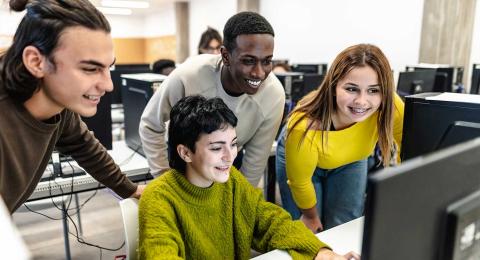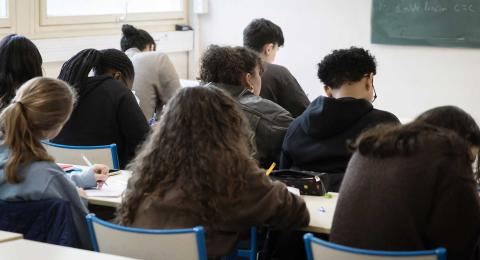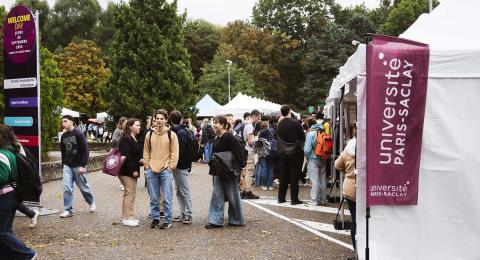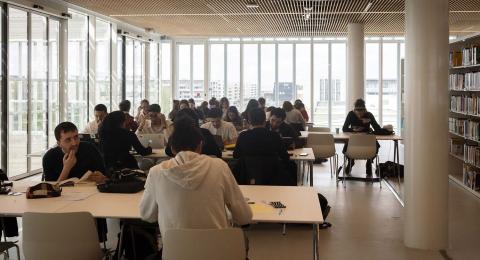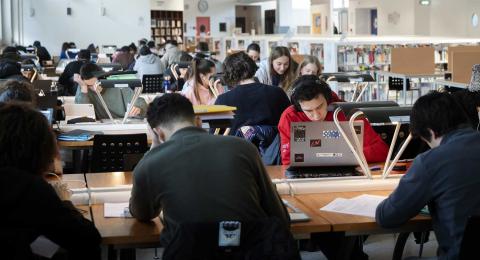"Shaping the future of Microbiology: explore, understand, innovate"
Fundamental Microbiology program is designed to inspire and train the next generation of researchers in microbiology offering multidisciplinary, research-driven training built on cutting-edge discoveries in genetics, genomics, cell biology, and microbial physiology. The program spans a wide array of models and topics to explore the microbial diversity using molecular, cellular, or integrated analysis scales (communities, hosts).
The program is organized into two tracks, “Molecular and Cellular Microbiology” and “Virology,” consisting of core courses in functional genomics, synthetic microbiology and data exploration using bioinformatics tools, specific courses tailored to each track, and a wide range of elective courses allowing students to acquire skills in microbial cell biology, microbial interactions, eukaryotic and prokaryotic virology, among other topics.
To complement these theoretical foundations by a hands-on experience, a two-week practical course in Integrative Microbiology is offered. Awarded the “Paris-Saclay” initiative label, this course is structured around flagship themes of the Paris-Saclay microbiology community and is primarily conducted in I2BC or MICALIS laboratories. It immerses students in real-world research settings, where courses are held within research institutes and researchers are directly involved in the training.
Information
Skills
- Master fundamental knowledge of microbial diversity and the fields of genetics and genomics, with a particular focus on microbial cell biology for the Molecular and Cellular Microbiology track, and a greater emphasis on understanding viral cycles in eukaryotic and prokaryotic cells for the Virology track. Both tracks provide an integrated view of molecular mechanisms and cellular interactions.
- Develop experimental expertise and proficiency in targeted and comprehensive approaches in microbiology (including experimental design, cloning, microbial culture or analysis of viral cycles, extraction and quantitative analysis of nucleic acids or proteins, and analysis and representation of data sets).
- Develop know-how in data exploration and representation (including basic use of R).
- Communicate effectively in English within a scientific context (understand seminars, follow instructions, present scientific background and experimental results, and engage in scientific discussion).
- Independently conduct a scientific project and communicate a critical analysis of the results, both orally and in writing, in accordance with international standards in microbiology.
- Develop teamwork skills through collaborative bibliographic and experimental projects related to microbiology.
Objectives
The program is international and with emphasis on research to prepare students for modern challenges in microbiology. It covers a variety of models (bacteria, archaea, eukaryotic microorganisms, viruses) and multiple scales of analysis from molecules to genomes, cells and communities.
During the first semester the students acquire knowledge in genomics and life engineering through core curriculum ”Explore and Innovate” completed by the practical courses and elective teaching units in the field of molecular and cellular microbiology, eukaryotic and prokaryotic virology, microbial interactions, and critical thinking using artificial intelligence among others.
During the second semester students undertake a six-month internship in a laboratory, providing hands-on research training in a microbiology-related field. This allows students to enhance their experimental and project-writing skills, and gives them ample opportunities to practice oral scientific communication. Internships can be completed in Paris-Saclay laboratories [e.g. Institute for Integrative Biology of the Cell (I2BC), “MICrobiologie de l'ALImentation au Service de la Santé Humaine” (MICALIS), “L'Institut Diversité, Écologie et Évolution du Vivant” (IDEEV), Laboratory of Biology and Applied Pharmacology (LBPA, ENS Paris-Saclay)], or other renowned research institutions (e.g., Institut Pasteur, Institut Jacques Monod, Ecole Polytechnique) in France or abroad.
The success rate of students enrolled in the M2 Fundamental Microbiology program is 94% (2015-2025). The average rate of M2 graduates continuing on to doctoral studies is 61% (2015-2025). Of these PhD theses, 55% are completed in a laboratory at Paris-Saclay University (UPSaclay), 33% in a French laboratory outside UPSaclay, and 12% abroad. Approximately 13% of graduates move directly into employment with a Bac+5 degree (as engineers, certified teachers, or communications officers at a research institute), and approximately 20% continue their studies (ENS curriculum, medical field, clinical research assistant, etc.).
Career Opportunities
Career prospects
Après un Master ou Master + Doctorat : ingénieur (R&D, contrôle, production…)
Après un Master ou Master + Doctorat : ingénieur (recherche-développement, contrôle, production…) dans les domaines santé, pharmacie, agroalimentaire, biotechnologies, instruments et réactifs, cosmétique, dépollution et environnement
Secteurs d'activité : recherche fondamentale ou appliquée en Biologie, Santé ou Écologie dans le monde académique ou dans le secteur privé
Domaines : santé, pharmacie, agroalimentaire, biotechnologies, instruments et réactifs, cosmétique, dépollution et environnement
Après Master + Doctorat : chercheur ou enseignant-chercheur
Après un Master ou Master + Doctorat : ingénieur (recherche et développement, contrôle, production…)
Ingénieur d’études / de recherche dans un service R&D dans l’industrie ophtalmique
Ingenieur R&D
Responsable de projets R&D
Responsable de projets R et D
Chef de projet
Ingénieur d’études dans les domaines de l’industrie
Ingénieur d’études dans les domaines de la recherche
Ingénieur d'études industrie / recherche publique
Sous réserve de réussite au concours de la fonction publique, les diplômés pourront accéder à des postes d'ingénieur d’étude ou chercheur au sein d’un organisme national de recherche
Enseignants-chercheurs
Ingénieur.e d’études
Ingénieur.e recherche & développement
Chargé.e de recherche et innovation
Chargé·e de projet
• Chargé·e de communication scientifique, veille technologique ou transfert de technologie
Chef·fe de projet en biotechnologies, biothérapies ou innovation en santé
Chargé·e de communication scientifique, veille technologique ou transfert de technologie
Ingénieur.e recherche et développement
Ingénieur de recherche ou d'études
métiers de la recherche
enseignant.e-chercheur.se (après un doctorat)
ingénieur.e d'étude
ingénieur.e de recherche
enseignant.e (après le concours du CAPES ou de l'agrégation)
Chargé de mission / projets
Ingénieur d'études
Ingénieur de recherche
consultant
Recherche en santé-environnement (analyse, toxicologie, microbiologie)
Further Study Opportunities
Biologie-AgroSciences
Cette orientation prépare en particulier aux activités de recherche appliquée, généralement exercées après un doctorat, que ce soit dans le milieu académique ou en R&D.
Chercheur/chercheuse en R&D ou expert·e en modélisation et analyse de données dans des entreprises ou laboratoires de pointe.
Doctorat
Doctorat en Bioinformatique
Doctorat en Chimie / Biologie
Les étudiants de cette mention peuvent se tourner vers la recherche à l’issue du M2
Les étudiants titulaires d’un M2 ont la possibilité de poursuivre dans la recherche en doctorat
ngénierie études, recherche et développement
S'ouvrir aux secteurs connexes et d'appréhender l'environnement des professions de santé, de maîtriser la réglementation applicable aux produits de santé, et de conseiller les promoteurs de projets scientifiques pour aider à la valorisation de celle-ci
Thèse de doctorat
Fees and scholarships
The amounts may vary depending on the programme and your personal circumstances.
Capacity
Available Places
Target Audience and Entry Requirements
Student profile: mainly students from scientific programs (universities or ENS), a few students from engineering schools, and more rarely students from medicine or pharmacy programs.
Approximately 50% of the class is made up of international students.
This program is tailored for students who have completed a master's degree in genetics and molecular biology and have theoretical and/or experimental knowledge in the field of microbiology sensu lato (bacteria, archaea, eukaryotic microorganisms, viruses).
For example, we recommend that M1 Microbiology students take, in addition to the core curriculum (which allows them to validate their skills in genetics, genomics, and cell biology, in particular), the teaching units (TUs) “Microbial Genetics and Physiology,” “Integrative Microbiology,” “Evolution and Diversity of Microorganisms” and/or “Functional Genomics”. For students wishing to follow the “Virology” track, a Virology teaching unit such as “Fundamental Virology” or “Integrative Virology” is strongly recommended.
Application Period(s)
From 27/01/2026 to 20/07/2026
Supporting documents
Compulsory supporting documents
Motivation letter.
All transcripts of the years / semesters validated since the high school diploma at the date of application.
Curriculum Vitae.
Additional supporting documents
Detailed description and hourly volume of courses taken since the beginning of the university program.
VAP file (obligatory for all persons requesting a valuation of the assets to enter the diploma).
Recommendation letters.
Document indicating the list of local M2 choices available here : https://urlz.fr/i3Lo.
Supporting documents :
- Residence permit stating the country of residence of the first country
- Or receipt of request stating the country of first asylum
- Or document from the UNHCR granting refugee status
- Or receipt of refugee status request delivered in France
- Or residence permit stating the refugee status delivered in France
- Or document stating subsidiary protection in France or abroad
- Or document stating temporary protection in France or abroad.






